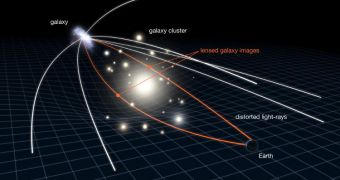A form of energy introduced in theoretical models in order to explain the ever-accelerating expansion of the Universe has been confirmed yet again in a new study. Astrophysicists say that dark energy must indeed exist, even if all efforts aimed at identifying it have thus far failed.
This quantity is currently believed to make up about 75 percent of the cosmic mass-energy budget. It acts by pushing the largest-scale structures of the Universe – clusters, superclusters and galactic walls – away from each other at increasing speeds.
When scientists first noticed this weird behavior of matter at large scales, they were left with two main options to explain it – either dark energy exists, or gravity acts as a repulsive force at the large scale.
In the new study, astronomers used an observations technique called gravitational lensing to investigate some of the most distant galaxies in the Universe. This approach uses light distortions created by various centers of mass (galaxies or black holes) to image objects located very far away.
The conclusions of the research were unequivocal – the Universe is indeed expanding, and the rate at which this process occurs is getting faster, Space reports. The first investigation of this type was conducted in the 1990s, using supernova explosions rather than galactic lenses.
“The accelerated cosmic expansion is one of the central problems in modern cosmology. In 2011 the Nobel Prize in Physics was awarded to the discovery of the accelerated expansion of the Universe using observations of distant supernovae,” researcher Masamune Oguri explains in a statement.
The expert holds an appointment with the Kavli Institute for the Physics and Mathematics of the Universe, at the University of Tokyo, in Japan. Expert Naohisa Inada, from the Nara National College of Technology, was also a part of the investigation, Space reports.
“A caution is that this method using supernovae is built on several assumptions, and therefore independent checks of the result are important in order to draw any robust conclusion,” Oguri goes on to say.
“Our new result using gravitational lensing not only provides additional strong evidence for the accelerated cosmic expansion, but also is useful for accurate measurements of the expansion speed, which is essential for investigating the nature of dark energy,” he concludes.
Details of the research will be published in an upcoming issue of the esteemed Astronomical Journal.

 14 DAY TRIAL //
14 DAY TRIAL //